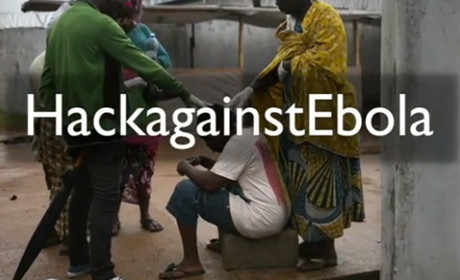
A crowdfunding campaign has launched in Ghana to finance two hack days for journalists in the region to develop open-source tools for covering the Ebola crisis.
The Global Editors Network (GEN) is organising the HackAgainstEbola campaign in partnership with PenPlusBytes, an ICT non-profit based in Ghana, to create "Ghanaian tools for the West African population" rather than implement Western ones.
"We want tools that will be simple and be adapted to the West African cultural framework," said GEN's programme manager Evangeline de Bourgoing, "and adapted to the means of communication of West Africa."
The hack days are due to take place on 19 to 20 November, bringing together 10 teams from news organisations in Ghana, each comprising of a developer, a designer and a journalist.
The crowdfunding bid on Indiegogo, launched on 15 October, aims to raise $9,000 (£5,572) to cover the cost of the event.
GEN has organised hack days in international newsrooms in the past as part of its Editors Lab programme, with a focus on encouraging the fast development of new tools.At the moment there's a real lack of reliable informationEvangeline de Bourgoing, GEN
De Bourgoing told Journalism.co.uk she hoped the prototypes in Ghana would include fact checking tools, alert systems, and a two-way communication tool between the public and the media.
"At the moment there's a real lack of reliable information, coupled with the circulation of misinformation about Ebola, and rumours have spread fear and confusion."
One rumour in Nigeria encouraged people to drink salt water to prevent them from becoming infected with Ebola, she said.
Two people died from this practice in August, and de Bourgoing said this was the type of misinformation the new tools could tackle.
A two-way communication system would not only enable the media to send alerts out to the public, but would also allow people to tell media organisations about new cases of Ebola, or explain what preventative measures are set up in their area.
"Lots of communities are in remote places and it's difficult to have information about them," she said, adding that new prototypes could help crowdsource this information.
Creating tools that work best in local communities was the thought underpinning the project, said de Bourgoing.
The teams would develop prototypes that take into account the low bandwidth and frequent power cuts in some areas of West Africa, for example.
The prototypes could also look at the potential of SMS as a news distribution channel, as many mobile phone owners in West Africa do not have access to a smartphone.
Working with community radio stations was also an opportunity, said de Bourgoing, as these stations are "very strong" in Ghana as a result of the number of languages spoken.
The use of audio to educate people about how to minise the risk of Ebola is also something GEN was interested in exploring further, she said.
GEN is not alone in this thought, as the BBC has recently launched a WhatsApp service to help with preventative efforts in the area.
Apps editor Trushar Barot highlighted audio clips as a format that could get information across despite low literacy rates in some of the affected countries.
The 10 prototypes developed as part of the hack days will be open-source, so journalists would be able to use the code to develop various tools that work in different languages.
The winning team will present their prototype at next year's GEN Summit, and will also have a mentor who will help with the development.
"It's really open innovation," explained de Bourgoing. "The event is just two days but we hope to create something that's going to last way longer and that people will implement in very different forms in their organisation."
She added that the prototypes were not aimed at "tech-savvy" users.
"Sometimes in hackathons you feel like it's developers developing gadgets for their peers, but we don't want that. We want something for everyone."
Related articles
BBC launches WhatsApp service in West Africa to fight Ebola
How Radar sources report from deep inside the Ebola crisis
Free daily newsletter
If you like our news and feature articles, you can sign up to receive our free daily (Mon-Fri) email newsletter (mobile friendly).
Related articles
- 40 essential newsletters every journalist should read
- #GENSummit19: data-driven travel content and trends in the digital landscape
- Digital News Report, #GENSummit and mobile journalism apps: here is your weekly journalism news update
- Facebook plans to help news publishers generate revenue
- New initiative Lookout360° is offering training and mentorship to help journalists produce immersive stories on climate change











